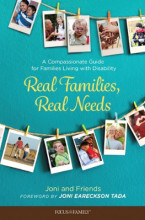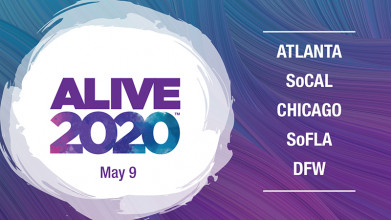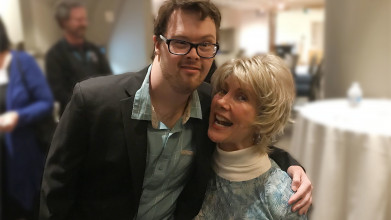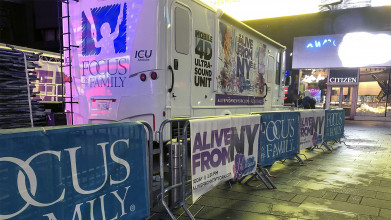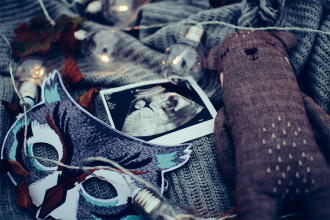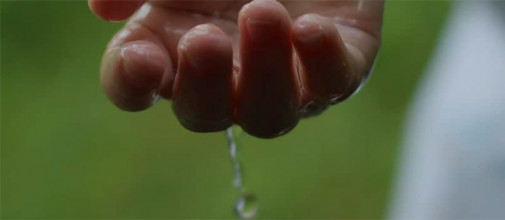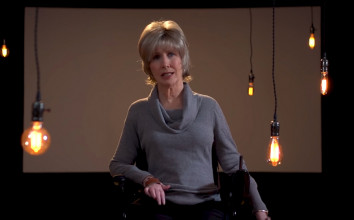Excerpt:
Joni Eareckson Tada: Fifty-three years ago, when I broke my neck and became a quadriplegic in a wheelchair – I tell you, it’s not easy every morning when you have to face someone who gives you a bed bath, someone who toilets you and wipes your backside. Someone who has to wipe your runny nose or someone who has to brush your teeth or feed you in a restaurant, someone who empties urine from your leg bag, someone who, let’s say, might have to have a colostomy. For me, human dignity was turned on its head, Jim.
End of Excerpt
John Fuller: Joni Eareckson Tada describing just a few of the enormous challenges that she’s faced with her disability since she was only 17 years old.
And yet, Joni has dedicated her life to advocate for those who are overlooked and devalued in our society — preborn children, the elderly, those with a terminal diagnosis, and people like herself who have obvious special needs.
We’re featuring Joni as our guest on this edition of Focus on the Family. Your host is Focus president and author, Jim Daly. And I’m John Fuller.
Jim Daly: Joni is one of my heroes. She really is. Because despite all of the hardship and obstacles she’s faced, she’s never given up. Joni is a faithful follower of Jesus Christ, and a powerful voice in the pro-life community.
What we’re sharing today is an interview you and I recorded with Joni in Anaheim, California, John.
And as the listeners are gonna hear, I had a pretty bad cold at the time. But the huge crowd of Focus friends who joined us didn’t seem to mind. And we had great evening together.
John: We really did. So many wonderful memories from that time.
Jim: Well, and Joni is one of several key Christian leaders who are helping us bring national attention to the pro-life cause and message — that human life, from conception to our final breath — is valuable, sacred, and worthy of our protection.
And that’s why last May Focus on the Family hosted the largest pro-life celebration in New York City’s Times Square, where we clearly revealed for the whole world to see that a baby is baby, whether the child is inside the womb or not
And we’re expanding this celebration nationwide with ALIVE 2020. It’s going to be on May 9th, the day before Mother’s Day. And we’ll be in five major cities simultaneously: Southern California, Dallas, Chicago, Atlanta and south Florida!
And I want to invite you to join us! Be a voice for the voiceless. We’re gonna hear inspiring messages from pro-life speakers, and great musical artists. And, of course, the star of the show will feature a live ultrasound of a 3rd trimester baby. So, come and be a voice for the voiceless.
John: Yeah, we’d love to have you there! And you can register for one of these free events at focusonthefamily.com/broadcast. Or call 800, the letter A, and the word FAMILY to learn more.
And now let’s go ahead and hear that interview with Joni Eareckson Tada.
Jim: Hey, we’re so glad you, the listener, can be with us today celebrating the sanctity and value and dignity of all human life. And, uh, I’m telling you, you respond when we have this topic on the Focus on the Family broadcast.
You know, as the Bible says in Genesis 1:26, we were created in the image of God. And we all, from the moment of conception to the end of our lives, possess great worth and value in God’s eyes.
And I don’t care what state you’re in, um, or what your situation is. God cares for you. Tragically, many people today don’t embrace these values. They don’t see the point in caring for pre-born children, the disabled, orphans – which, I was one – or the elderly.
They consider the weak and vulnerable to be a burden to our society. And unfortunately, that’s a growing attitude within our culture. That’s why we’re here – to remind our world of these values and affirm our commitment to protect, rescue and advocate for life. And we’re honored to be joined, um, in this effort by our good friend, Joni Eareckson Tada.
John: Yeah. Joni is such a well-known author. (APPLAUSE)
Jim: I think they love you, Joni!
Joni: I think so.
John: I was just going to say, Joni is obviously a beloved person – a well-known author, radio host, artist and a wonderful pro-life champion. Um, her organization, Joni and Friends – 40 years of ministry. That is tremendous!
Jim: That’s right – 40th anniversary.
Joni: That’s right.
Jim: Yep. (APPLAUSE)
John: Joni and Friends serves individuals and families globally with disabilities in some amazing ways. And just congratulations for all that.
Joni: Thank you for that.
Jim: It’s great to have you.
Joni: Absolutely. And, you know, I love this topic – sanctity of life – because, as we all know, we live in a culture of contradictions, don’t we? On one hand, society says that it extols human dignity. But on the other hand, it also says you might be better off dead than disabled.
Joni: If you are so old that you are eating up those precious, scarce health care dollars, maybe it just might be your duty to die. Or if that child within your womb is pre-born and has some sort of physical defect, well, we know its quality of life would be very poor, so give us the option to end that life early and spare you parents the misery of raising a child with a disability. We don’t buy that one bit, do we, gentlemen?
Jim: We do not. In fact, uh, Joni, you speak often about that idea of human dignity and what it means. And I think we need to define that word. I mean, what does dignity mean to the human being?
Joni: Well, dignity is, um, the right of a person to be valued and respected, um, for their own sake and be treated ethically. Um, the English word, I think, means worthiness. But if you really want to understand human dignity, we’ve got to go right back to the Bible because we are created in the image of a God who values life.
I mean, look at Jesus. Look what he said of himself. “I am the prince of life. I am the resurrection and the life. I am the way, the truth and the life. I have the words to life.” He’s all about life. Life is so precious. And because we are stamped in his image, we are to treat each other with respect and human dignity.
Jim: Yeah. And that’s powerful right there. (Applause)
Joni: Right.
Jim: Um, we are going to acknowledge some people struggle in this life. They are in some very serious valleys. And that’s part of your testimony.
Joni: Yeah.
Jim: Um, you share a story about a young girl – I think her name was Jillian – um, who was born with Down Syndrome. Describe what happened to Jillian and how that represents an inconsistent appreciation for the dignity of human life today.
Joni: Well, Jillian, um, was a shy and a happy 12-year-old with Down Syndrome. And when the family moved to a new town, Jillian’s parents, um, opted for cosmetic surgery to make Jillian’s appearance more typical. They – they wanted to hide Jillian’s disability to make her more, quote, “socially acceptable.”
But, sadly, they were violating that young girl’s human dignity. Now, some might say, “Well, she’s just a little girl. It was a question of her dignity being violated, that child lacks the cognitive capacity to experience any kind of dignity.” People on hospital ethics committees really are saying that.
Jim: That’s amazing.
Joni: They actually are. But if you take a thought like that to its logical conclusion, then why not let the Alzheimer’s patient run around without clothes on? Why not let the mentally disabled person in a psychiatric institution eat off the floor? That’s where that kind of logic would take us. No, we need to preserve the – the God-blessed dignity of a child like Jillian and not conform her to society’s norms but change this – how about we change society?
Jim: Yeah.
Joni: Don’t you think so? (Applause)
Jim: Yeah.
Joni: …To understand and appreciate and accept a child like Jillian. She doesn’t have to go through a cosmetic, optional surgery – which, incidentally, was extremely invasive and probably a little dangerous, don’t you think?
Jim: Well, that’s such a sad story.
John: It must have reflected a parent’s deep pain for them to even consider going to that – down that road, Joni.
Joni: Absolutely. I think they were motivated by fear and misinformation. Um, and the sad thing is, is that we as Christians – you know, the Bible talks about not only being hearers of God’s word but doers of it. Her parents would have no doubt changed their perspective had they known other children with Down Syndrome, other parents – Christian parents, perhaps.
In fact, today, gentlemen, I downloaded – John, grab that piece of paper there. I downloaded this document from the National Institutes on Health, OK?
Jim: Yeah.
Joni: This is an abstract from a study that was published in the American Journal of Medical Genetics. And this is what it says: This study researched 284 people with Down Syndrome ranging in age from 12 and older. And what it says here – of these Down Syndrome individuals who were interviewed, 99% of them with Down syndrome indicated that they were happy with their lives. Ninety seven percent liked who they are. And 96% – and I bet Jillian could have included herself here – 96% liked what they looked like. They enjoyed…
Jim: Wow.
Joni: They liked their appearance.
Jim: Think of that.
Joni: Absolutely. And this study went on to say that they further encouraged health care professionals to value them and emphasizing that they share similar hopes and dreams as people without Down Syndrome. And overall, the overwhelming majority of people with Down Syndrome surveyed indicated they lived happy and fulfilling lives. I want you guys to applaud that.
Jim: Yeah. (Applause) For sure.
Joni: That’s a powerful fact. (Applause) Yeah. Yeah. (CHEERING) Is that Trevor? Trevor? In case the audience – in case our listening friends are wondering why all the applause, 29-year-old Trevor just stood up on the front row. He has Down Syndrome. Trevor, I bet you think your life is pretty happy, don’t you?
Trevor: Yes.
Joni: Yeah. I thought, “OK, good.” Yeah! (APPLAUSE)
Joni: And, Jim and John, if only Jillian’s parents had known some of those children, some of those parents who were surveyed in that National Institutes on Health study.
Jim: Yeah, it’s a stunning study. And it supports the idea that maybe other people don’t know what’s good for you…
Joni: Exactly.
Jim: Right? I mean, that’s the bottom line. I think even for those that have different situations – your situation as a quadriplegic – uh, for 50 years. Joni, you have lived, you know, dependent upon that chair, and that’s an amazing thing. And yet you’re buoyant. Joni: Well, I wasn’t…
Jim: Why? Well, I mean let me ask it this way – the tough question. (LAUGHTER) And not many people get a word over Joni. That was pretty good! (LAUGHTER) But Joni, let me say it this way. The tough question – why does your life have value?
Joni: Well, 50 years ago, I didn’t think it did. Fifty-three years ago, when I broke my neck and became a quadriplegic in a wheelchair – I tell you, it’s not easy every morning when you have to face someone who gives you a bed bath.
Jim: Mm.
Joni: Someone who toilets you and wipes your backside. Someone who has to wipe your runny nose or someone who has to brush your teeth or feed you in a restaurant, someone who empties urine from your leg bag, someone who, let’s say, might have to have a colostomy. For me, human dignity was turned on its head, Jim.
Jim: Yeah.
Joni: When I was first injured, and when I learned that I was going to be a lifelong quadriplegic – oh, my goodness – somebody handling my spit, my runny nose, my urine, feed me in a restaurant. Well, let’s get to the heart of it. Not many people – for most people, that’s beneath their dignity. And trading your autonomy for a lifetime of pain and inconvenience – most would say “That’s no quality of life; that girl has no quality of life.”
But if comfort and convenience and autonomy determine your life value, then I’ll tell you what. In this day and age, your last straw at dignity is to choose with what little autonomy you might have left – to choose something like physician-assisted suicide. And most people, for a medically fragile – let’s say a ventilator-dependent quadriplegic, if that individual chose to end his life in any one of nine states, including the District of Columbia, where physician-assisted suicide laws are legal, all it would take would be a quick court ruling to expand the definition of terminal illness, and that quadriplegic might be escorted to a final exit that years later he might not want.
Jim: Hm.
Joni: I’ve got to tell you something real quick. When I was in the hospital, I had, uh, a roommate named Ada. Now, I was stuck on a geriatric ward for almost a year. This was back in the ’60s, before there was a lot of good rehabilitation centers. And in our six-bed ward, Ada was from West Virginia. She had a broken neck. She was terribly depressed. And she would spend her days, Jim, um, sitting in her wheelchair in the room. And on her table lap board, she had, like, a little tray with a tiny tube. And in it, nurses or aides would stick cigarettes – because back then, you could smoke in a hospital or a rehab center. (LAUGHTER) Really, you could. And they would stick her cigarettes in this tray. And there was a long tube that she held between her teeth. And she’d – phiff – pull on that tube and inhale that smoke and then let it out slowly, pull on that tube, inhale that smoke, let it out slowly. One day, I passed her on the way to physical therapy, and I said to her, “Ada, you’re going to kill yourself doing that.” (LAUGHTER) And she said, “That’s the point, isn’t it?”
Audience: (murmurs)
Jim: Wow.
Joni: This – this young girl was trying to engineer her own death. But the sad thing is, years later, when she was released from that rehab center, she came to know Jesus Christ as her personal savior. (Applause)
Jim: Yeah. Amazing.
Joni: Isn’t that wonderful?
Jim: And in the…
Joni: But by that time, it was too late.
Jim: Oh.
Joni: Lung cancer had, uh, gripped her lungs. Her lungs were black. And this young girl – well, she wasn’t a young girl at that point. She was much older by then. But by that time, she lost her life, and it was too late. She found too late that her life was worth living.
And that’s why I think this program that we’re doing today and friends of ours here in Orange County gathered. We’ve got to be not just hearers of this kind of pro-life speak. We’ve got to be doers. We’ve got to befriend those like Ada who are despairing because of deep depression and help them understand that Jesus Christ makes life worth living.
John: A really challenging story and a reminder from our guest, Joni Eareckson Tada, on today’s Focus on the Family.
If you want to be a “pro-life doer” as she just described we encourage you to participate in one of our Alive 2020 events coming up on May 9th. We’ll be in five cities on that day. Look for details at focusonthefamily.com/broadcast. Or call 800, the letter A, and the word FAMILY.
Let’s continue now, hearing from Joni Eareckson Tada on Focus on the Family.
Joni: I remember Chuck Colson telling me years ago when physician-assisted suicide was still a, quote, “secret in the closet” that they were practicing only in Belgium, only in the Netherlands, only in Switzerland but not in the United States. And he said to me, “Joni, you wait. As soon as this becomes part of public discourse, as soon as it’s discussed on The View or as soon as Larry King Live or – or – or CBS does an expose on a person’s, quote, ‘right to choose’ – not just abortion but the timing of his own death – once you open that door and let that skeleton out of the closet, it becomes the norm. It becomes acceptable.”
People are no longer – they are no longer shocked by the audacity of it. We become inured. We become calloused to the idea that it’s quite OK for a person to take his life. I mean, if she takes the life of her unborn child in her womb, why shouldn’t she take the liberty to choose the timing of her own death?
Now, you two will agree with me that all this can be traced back to the Roe v. Wade decision in 1973, when the U.S. Supreme Court ruled that within our U.S. Constitution, there is encased a, quote, “inherent right to privacy.” And so, if you have a right to privacy, you have the legal right to end that pre-born child’s life in your womb. You have the right to choose the timing of your own death. And you have the right to change your sex if you so – should so decide.
We had no idea back in 1973, although people like Francis Schaeffer and others did. But for the most part, we Christians were clueless as to what that ruling actually meant. And that’s why people are still campaigning even now to reverse that – that ruling.
Jim: Joni, uh, you know, emphasizing the pro-life area – again, because I think the cruelty of it – the blindness – and I know some might even say as we talk about people that are blind – uh, Chuck Colson said something to me that I’m sure he’s said on the radio or some other program. But he said, “You know, Jim, we don’t get mad at the blind man who steps on our foot.” And I think in this context, when we talk about the culture, I’m mindful of the fact that people don’t see it, they don’t get it. It’s – it can be very, uh, frustrating for us that they don’t understand why we’re pro-life.
In fact, when we were in New York, people were throwing terrible, uh, vulgarities at us as we were on the stage – spitting, throwing things at the mobile unit where we were about to do this third-trimester, uh, ultrasound. And I remember we stopped and just prayed for them – openly, publicly. “Lord, we pray for these people that the scales would fall from their eyes, that they would see why we talk about life.”
How do you balance that – kind of the Peter in the garden. I always loved Peter in the garden – strapping on the sword, you know? I think a lot of guys in this room would do that. Now, I don’t think we’d be aiming for the guy’s ear (laughter). But the point of that is Stephen, filled with the Spirit of God, is able to pray for those killing him with the presence of mind to say, “Lord, don’t hold this against them.” How do we develop more of a Stephen attitude, especially – especially in this place where frustrations can run high, arguments can run deep, emotions can get the best of us? So how do we manage that?
Joni: Well, first, I think we need to remember that when those people in New York were spitting at you and throwing tomatoes and cans at you…
Jim: You got that about right.
Joni: Well, it shouldn’t surprise us because Satan absolutely hates us, the epitome of God’s creation. We are the epitome. We are the most excellent example of God’s creative genius. And as I said earlier, Satan is a liar. He’s a murderer. He’s an accuser of the brethren. And, of course, he’s going to do everything. He’s going to push the crowds. He’s going to motivate people to kill the very thing that God absolutely loves and sent his own son to die for. So, I think we need to remember that we are up against a fierce enemy.
Um, I heard Chuck Swindoll preach this past Sunday, and he was in the Book of Job. And he was explaining that in Hebrew, the – the – the name for Satan is “hass-sitan” (ha-satan). Isn’t that creepy? (LAUGHTER) Doesn’t that sound like a snake? I mean, we are up against a fierce enemy, so let’s remember that it is a satanic, devilish scheme that incites people against those who are pro-life.
It is the devil who causes people to throw the cans and the tomatoes and to curse those who are so strongly pro-life…
Which puts the onus on us to come back and reflect the love and the mercy of the Lord Jesus…
Jim: Yeah.
Joni: …As best as we are able.
Jim: That’s absolutely right.
Joni: Yeah. (APPLAUSE)
Jim: I’ve kind of said it this way. I’ve not encountered a testimony where a person has said to me, “Those Christians were so tough on me, they treated me so poorly, I decided to become one of them.” (LAUGHTER) You just don’t encounter that testimony. It’s the love of God through us, through our attitude, that people are changed because they can understand it. It’s Stephen, not Peter in the garden.
Joni: And let’s remember that pro-life is not just campaigning for that pre-born child in the womb. But it is encouraging and serving that mother of that special needs child, embracing her in our fellowship, providing resources as best we can, connecting her with ministries and organizations who can – who can support her. I mean, we’ve got to be pro-life not just as it concerns pre-born children in the womb, but that child born with Down syndrome or born with Trisomy 18 or born with muscular dystrophy or born with autism.
I mean, I know pastors who have really struggled because, well, there are some children with autism in their Sunday school classrooms who are just having meltdowns. They’re going ballistics. They’re peeing on the Sunday school room wall. And the knee-jerk response to something like that is to go up to the parents and say, “Well, um, we wish we could accommodate your child here at our church, but we think there must be other congregations that are better suited to serve your family’s needs. I’m sorry, but – but we just can’t welcome you back here.”
Jim: Well, in fact, we don’t even take the time to create that list…
Joni: Yeah.
Jim: …That we can give you. I mean, that’s amazing.
Joni: Right.
John: Yeah, on the – on the flipside, there are churches – lots of good churches – um, we have the privilege of attending one that has accepted our son, who has some special needs. I don’t think he peed on the walls, but he (Laughter) did other things. (LAUGHTER) He did lots of other things!
Joni: Look…
John: And one time, I was talking to our pastor’s wife, and I said, “What was that about last week?” And she said, “Oh, that was just that substitute teacher. He needs to get over it and just let your son be his – himself.”
Joni: Well, you…
John: I thought, “That is a picture of grace…”
Joni: Yes.
John: “…And acceptance.”
Joni: Yes.
John: And we needed that…
Joni: Yeah.
John: …Desperately – not the judgment that “You must be a poor parent,” but that welcoming attitude that says, “This child is part of our family. We’re going to love on him and accept him for who he is even though it’s uncomfortable at times.”
Joni: Absolutely. My friend Jackie Fernald, who was head of Access Ministries at McLean Bible Church in McLean, Va. – I mean, she’s told me many a story of wrestling that kid with autism down on the Sunday school room floor and just helping him get over that – that meltdown, providing what’s called proprioceptive input. That is, quote, “deep pressure therapy,” where you just hold fast and hold tight to a child who’s having a meltdown and give him orientation, give him that feeling of security. Help them, uh, become comfortable in her – in his surroundings. She has wrestled so many kids with disabilities to the floor, and now some of those kids are World Vision sponsors of children in Guatemala.
Jim: Oh, man.
Joni: They’re praying for missionaries. They are the – are greeters at McLean Bible Church. It’s amazing how a demonstration (Applause) of Christian love can change a person’s heart.
Jim: That’s the point, right? That’s the whole goal. Give her a hand. (Applause)
Joni: Yeah. Yes.
John: This is Focus on the Family with Jim Daly. And what a powerful pro-life message and challenge from Joni Eareckson Tada, who joined us and a live audience for that broadcast recording in Anaheim, California.
Jim: John, that evening with Joni was a moving experience, and you could tell how so many people in the crowd were inspired. Not only by Joni’s words, but by her legacy of faithfully following the Lord and speaking up for those who can’t speak for themselves
I hope our listeners today are inspired as well. And I want to invite you to join Focus on the Family in speaking up about the sacred value of human life, created in God’s image.
As believers in Christ, we all have a responsibility to protect precious life — of the preborn babies, those with special needs, the elderly, orphans — everyone!
That’s why Focus on the Family is hosting ALIVE 2020 — a nationwide pro-life celebration on Saturday, May 9th. We’ll be in Southern California, Dallas, Chicago, Atlanta and south Florida, all on the same day at the same time. And we’d love for you to join us at one of these free events. This is your opportunity to be part of something big! And to help change hearts and minds about this critical issue of life!
John: Register today at focusonthefamily.com/broadcast. Or when you call 800-A-FAMILY. 800-232-6459.
And we have something really special for you. It’s Joni’s autobiography, called Joni: An Unforgettable Story.
Ask for your copy of this inspirational book, along with an audio copy of our entire conversation with her in California. That’s gonna include what we share next time, as well.
Jim: I do hope you’ll contact us about Joni’s wonderful book. It’s special story about a very special lady, and I know your entire family will enjoy reading Joni: An Unforgettable Story.
And we can put this book into your hands when you send a gift of any amount to Focus on the Family.
John: Get Joni’s book and donate when you call 800, the letter A, and the word FAMILY. Or at focusonthefamily.com/broadcast.
Next time, more from our guest about how to live out your pro-life beliefs every day.
Teaser:
Joni: I discipline myself every morning to rehearse whose image I bear. My body might be broken, but I am a God reflector. I mirror a God who was pleased to make me in his image, and that is what gives me human dignity.













